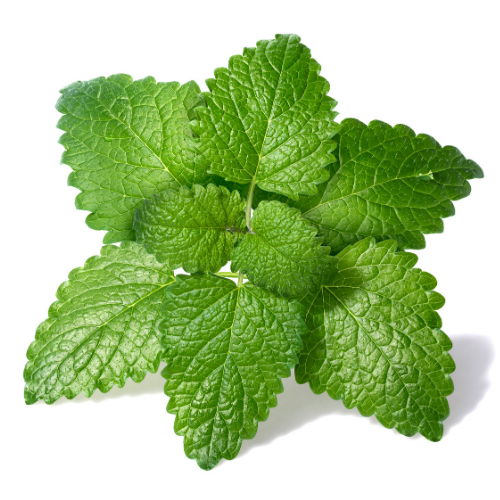
We love it for..
Stress Relief, Calming Nerves, Nervous Stomach
Lemon balm’s botanical name, Melissa, comes from the Greek for bee and refers to the great attraction the plant holds for bees.
Why We Love It
In writing that “Balm is sovereign for the brain, strengthening the memory and powerfully chasing away melancholy,” John Evelyn (1620–1706) neatly summarized lemon balm’s long tradition as a tonic remedy that raises the spirits and comforts the heart. Today, this sweet-smelling herb is still widely valued for its calming properties, and new research shows that it can help significantly in the treatment of cold sores.
■ Traditional uses This herb has always been taken to lift the spirits. Taken regularly, it was believed to encourage longevity. Other traditional uses include healing wounds, relieving palpitations and relaxing the heart, and treating toothache.
■ Modern relaxing tonic Lemon balm is a relaxing tonic for anxiety, mild depression, restlessness, and irritability. It reduces feelings of nervousness and panic and will often quiet a racing heart, being
a valuable remedy for palpitations of a nervous origin. Lemon balm is also useful when too much anxiety is causing digestive problems such as indigestion, acidity, nausea, bloating, and colicky pains.
■ Cold sores Lemon balm relieves cold sores and reduces the chances of further outbreaks.
■ Hormonal herb Following the discovery of its antithyroid effect, the herb is given to people with an overactive thyroid.
■ Other uses Lemon balm is a first-aid remedy for cuts and insect stings and is good for fevers.
Research Resources
| Scientific Name | Melissa officinalis (Lamiaceae) |
| Scientific Name | A perennial growing to 5 ft (1.5 m), with tiny white flowers and deeply veined, toothed leaves. |
| Constituents | Volatile oil up to 0.2% (citral, caryophyllene oxide, linalool, and citronellal), Flavonoids, Triterpenes, Polyphenols, Tannins |
| Habitat & Cultivation | Native to southern Europe, western Asia, and northern Africa, lemon balm now grows throughout the world. The plant is propagated from seed or cuttings in spring. The aerial parts are picked from early summer onward and are best harvested just before the flowers open, when the concentration of volatile oil is at its highest. |
| Parts Used | Aerial parts are used in a variety of preparations as a calming remedy. Leaves produce a lemon scent when crushed |
| Key Actions | ■ Relaxant, Antispasmodic, Increases sweating, Carminative, Antiviral, Nerve tonic |
| Cautions | Do not take the essential oil internally except under professional supervision. |
Clinical Studies
■ Volatile oil German research
has shown that the volatile oil, and in particular citral and citronellal, calm the central nervous system. The oil is also strongly antispasmodic.
■ Polyphenols Polyphenols are antiviral. In particular, they combat the herpes simplex virus, which produces cold sores. In one research study, the average healing time of cold sores was halved to about 5 days and the time between outbreaks doubled.
■ Thyroid Lemon balm inhibits thyroid function.
Source: Encyclopedia of Herbal Medicine